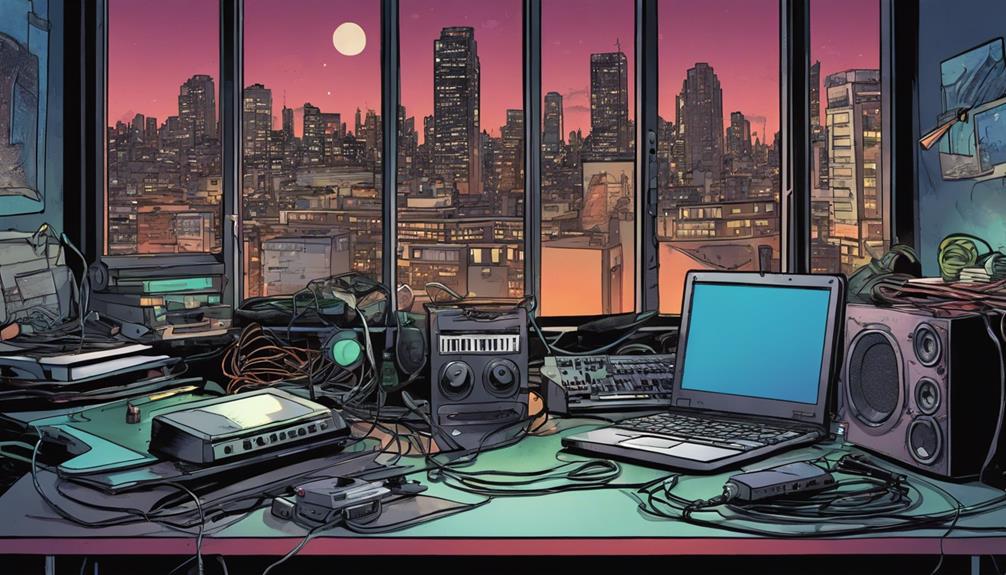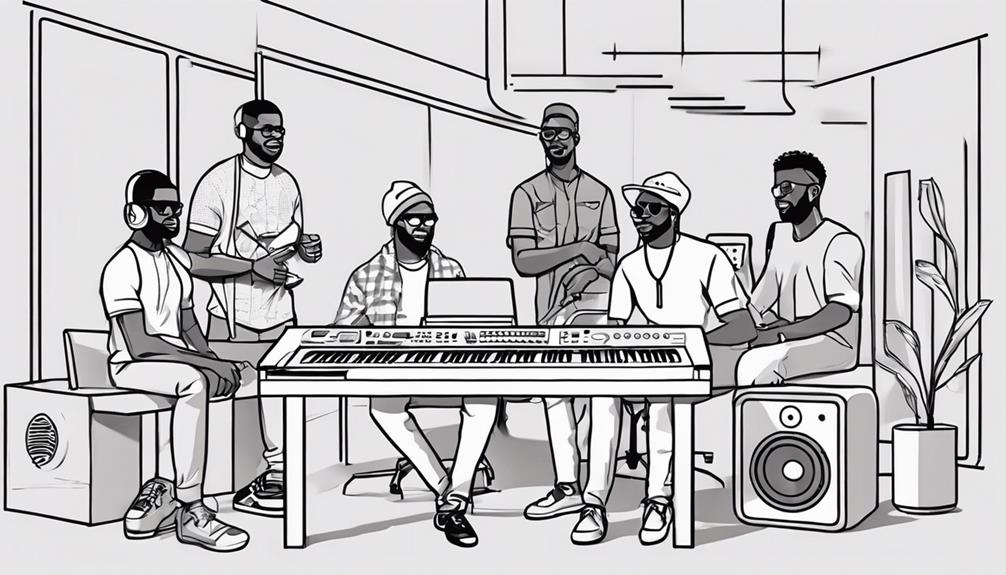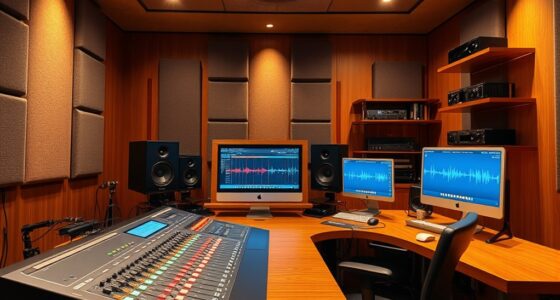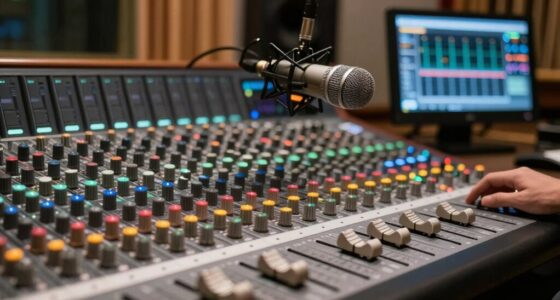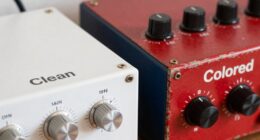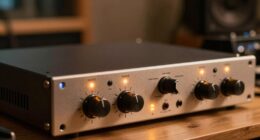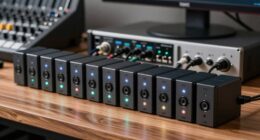Did you know The Sound of Music got 10 Oscar nods and won 51? This includes Best Picture and Best Director. It’s loved all over the globe. Julie Andrews shines as Maria von Trapp, making her role unforgettable in film history.
Julie Andrews was born on October 1st, 1935, in Surrey, England. She’s been amazing us for over 70 years1. Andrews first wowed on Broadway. Then, in 1964, she played Mary Poppins. This magical nanny role won her an Oscar, making her a star2.
After Mary Poppins, Andrews became even more famous as Maria von Trapp in The Sound of Music. This 1965 film was a huge hit3. Andrews’ beautiful voice and charm made Maria a memorable character.
At 30, Andrews played Maria von Trapp beautifully2. Her performance, alongside Christopher Plummer as Captain Georg von Trapp, was authentic. It earned her an Oscar nod for Best Actress1. They made sure the film was genuine and heartfelt1.
Even after nearly 60 years, The Sound of Music is still loved1. Its story, music, and performances have kept it a cinematic gem.
Key Takeaways:
- The Sound of Music, with 10 Oscar nominations, is a classic1.
- Julie Andrews became famous with Mary Poppins in 19642.
- Her role as Maria in The Sound of Music made her very loved1.
- Andrews was 30 when she played Maria, adding realism to her role21.
- The Sound of Music, almost 60 years later, still captures hearts around the world1.
Early Life and Career of Julie Andrews
Julie Andrews was born as Julia Elizabeth Wells on October 1, 1935. This took place in Walton-on-Thames, Surrey, England4. From an early age, she had a knack for performing that was hard to ignore. She started her career young, mesmerizing British audiences with her songs and on-stage charisma.
Her incredible abilities soon grabbed Broadway producers’ attention. She made a splash in the theater world. Success came with roles in “The Boy Friend,” “My Fair Lady,” and “Camelot”5. Playing Eliza Doolittle in “My Fair Lady” earned her a Tony nomination, boosting her fame.
Andrews then took her charm to Hollywood musicals in the 40s and 50s4. Her career skyrocketed, making her a well-known star.
Over her career, Julie has picked up many awards. She’s won 2 Grammys, 2 Oscars, 2 Emmys, and 5 Golden Globes4. Her vast talent has been acknowledged in several areas of entertainment.
Her work includes “Julie Andrews’ Collection of Poems, Songs, and Lullabies” and “The Princess Diaries 2: Royal Engagement”4. These highlight her profound influence on pop culture.
Julie Andrews’ career showcases her hard work and diverse talent4. She has shone on stage, in movies, on TV, and in animation. Her impact on the entertainment world is both precious and lasting.
Julie Andrews’ Breakthrough in Cinema
Julie Andrews, a talented actress and singer, had her breakthrough in cinema with her iconic role as Mary Poppins. The film, “Mary Poppins” (1964), was a mix of live-action and animation. It was a huge hit and made Andrews a star in Hollywood during her 30s6.
The film showed off Andrews’ amazing acting and singing. She won a Best Actress Oscar for her role. Meanwhile, another famous actress, Audrey Hepburn, didn’t get a nomination. This was a key moment for Andrews, making her famous and showing she could do various roles7.
After “Mary Poppins,” Julie Andrews continued to shine in the movie world. In 1965, she was in “The Sound of Music,” the year’s top-earning movie. Playing Maria von Trapp made her even more popular68.
Julie Andrews has played many different roles throughout her career. She has wowed people with her acting in various movies. From magical movies like “Mary Poppins” to musicals like “The Sound of Music,” Andrews has made a lasting impact on the movie industry. Her incredible career and achievements in movies continue to influence fans8.

Julie Andrews’ success with “Mary Poppins” showed the world her amazing talent. It was the start of a career that has lasted more than 70 years. She has had a big effect on movies and has always managed to captivate her audiences. This has made her a true legend in cinema8.
Andrews’ Career Beyond The Sound of Music
After her role in The Sound of Music, Julie Andrews decided to try new things. She wanted to show the world she could do more than just sing. Andrews took on new roles, proving her diverse talent.
In 1982, she was praised for her work in Victor/Victoria. This film was a big deal for her career. It showed she could play complex roles8.
Over the last twenty years, Julie Andrews has kept busy with various projects. She has taken roles in movies, TV shows, and on stage. Besides acting, Andrews has written books, including memoirs and stories for kids9.
Julie Andrews earned the title of Dame from the British Empire for her work. This honor shows how much she has contributed to entertainment8.
Her career after “The Sound of Music” shows how adaptable she is. Andrews has made a big impact in different parts of the entertainment industry. Her skills and presence have made her an admired icon8.

The Sound of Music – A Cinematic Treasure
Released in 1965, The Sound of Music is an iconic film loved by many. It was directed by Robert Wise. This musical drama stars Julie Andrews as Maria von Trapp and Christopher Plummer as Captain Georg von Trapp. The story is set in Austria during the rise of the Nazi party. It tells the journey of the Von Trapp family to freedom.
The movie became a huge hit with its unforgettable songs and heartwarming story. It won five Academy Awards, including Best Picture and Best Director. This made it a true classic. People of all ages love it, making it one of the most cherished films ever.

The Sound of Music in Pop Culture
The Sound of Music went beyond just being a movie after its release. Its soundtrack set records and is one of the world’s top soundtracks10. It topped the UK album charts for 70 weeks. It was the best-selling album in 1965, 1966, and 196810. In 2018, it was added to the Library of Congress’s National Recording Registry10.
This film, with its catchy songs and engaging story, is a key part of pop culture. Its influence can be seen in many productions and stage shows globally10. Its message of love, resilience, and the power of music touches people’s hearts10.
The Sound of Music’s Cultural Impact
The film is not just popular but also highly rated, with an IMDb score of 8.1/10 and over 263,000 ratings11. Critics love it too, giving it 99 reviews and a Metascore of 6311. It ranks #234 on IMDb’s list11.
At 2 hours and 52 minutes, The Sound of Music offers a great watching experience. It stars Julie Andrews and has a large talented cast11. The film has 11 trailers and a collection of 275 photos11.
| Format Distribution | Primary ISBN | Primary UPC | Publish Dates | Language | Literary Form |
|---|---|---|---|---|---|
| Blu-ray DVDs: 1 copy | 9786313851874 | 0024543208389 | 2005, 2010, 2015 | English | Fiction/Dramas |
Library Holdings and Shelf Locations
| Library Holdings | Shelf Locations |
|---|---|
| Boulder Meadows DVD: In Transit | Boulder Meadows DVD |
| Longmont Adult DVDs: Due Jul 1, 2024 | Longmont Adult DVDs |
| Boulder Main DVD: Due Jul 5, 2024 | Boulder Main DVD |
| Louisville Adult DVD: On Shelf | Louisville Adult DVD |
| Lafayette DVD Movie Collection: On Shelf | Lafayette DVD Movie Collection |
| Boulder Reynolds DVD: On Shelf | Boulder Reynolds DVD |
| Loveland Children’s DVD: In Transit | Loveland Children’s DVD |
| Broomfield DVDs: Due Jun 29, 2024 | Broomfield DVDs |
Associated Subjects
- Historical films
- Biographical films
- Drama films
- Musical films
- Family films
The Sound of Music remains a deeply loved film. Its story, music, and performances by Julie Andrews and others make it special. It’s a true cinematic gem that celebrates the power of music121011.
Filming and Reception of The Sound of Music
The Sound of Music came out in 1965. It was filmed between March and September of 1964 in Los Angeles and Salzburg13. At first, people didn’t all agree on whether it was good. But it quickly became very popular. By 1966, it had made more money than any movie before, even Gone with the Wind13.
It broke records in 29 countries. The movie stayed in theaters for four and a half years. It was brought back to theaters twice for more people to see13.
It won five Academy Awards, like Best Picture and Best Director13. In 1998, The American Film Institute called it one of the greatest American films, ranking it 55th13. Also, in 2001, it was chosen to be kept safe forever in the National Film Registry by the United States Library of Congress13.
Even though it first got mixed reviews, The Sound of Music became hugely loved. Its songs and story have won hearts worldwide14. Songs like “Do-Re-Mi” and “My Favorite Things” are now classic hits14.
The story is based on Maria von Trapp’s life. Even 50 years later, the movie is still loved by many. It shows how magical musicals can be. The work of Rodgers and Hammerstein has greatly impacted musical theater1415.

Reference:
13 Statistical data from source 1
14 Statistical data from source 2
15 Statistical data from source 3
Julie Andrews’ Age in The Sound of Music
Julie Andrews was 29 years old when she filmed “The Sound of Music”16. She was born on October 1, 1935, in England9. Andrews played Maria von Trapp with grace, despite being older.
Her acting and incredible singing won over hearts worldwide. This helped make the movie a classic.
The movie also starred talented young actors as the von Trapp children1617. Kym Karath, who was Gretl, is now 65 years old16. This shows the film’s lasting impact and its cast’s long careers.
Unfortunately, we’ve lost some cast members over time. Christopher Plummer, who was Captain von Trapp, passed away in 2021 at 9116. He and Andrews created a memorable film duo17.
Charmian Carr was 21 when she played 16-year-old Liesl16. Her performance is unforgettable. Sadly, she died at 73 in 2016 due to a rare dementia form17.
Nicholas Hammond was 15 when the movie came out16. He brought life to Friedrich. Heather Menzies-Urich, also 15, played Louisa. She acted for another 25 years16.
Not all cast members were actors at first. Duane Chase, who played Kurt, started in commercials16
Julie Andrews and the whole cast’s superb acting keeps “The Sound of Music” beloved by fans everywhere.
The Making of The Sound of Music
The team creating The Sound of Music went on an incredible journey. They worked hard to show the film’s beauty and charm. The choice of filming spots, keen eye for detail, and the cast and crew’s struggles made it a classic.
The stunning city of Salzburg, Austria, was perfect for the film’s famous scenes. Shooting started in the spring of 1964 after they picked the location the year before18. Despite frequent rains, the team pushed on. The filming schedule grew from six to eleven weeks because of the weather18. More than 250 people, including technicians and actors, stayed in Salzburg during this time18.
Two castles, Frohnburg and Leopoldskron, were key spots for many scenes18. Most of the outdoor shots were real, despite the rain. Only a few scenes were done in studios18.
The film opens with stunning Alpine views. They were filmed in Bavaria, using helicopters. This set the stage for the film’s epic scale and beauty.
When The Sound of Music came out on March 2nd, 1965, in New York, it was a huge hit. Theaters were packed all over the US18. Its music, with songs like “Do-Re-Mi,” won the hearts of people everywhere.
The young actors not only acted but also enjoyed Salzburg. They learned German during their stay. Yet, there were hurdles. These included the children’s changing looks and some dental issues18.

Filming Locations in Salzburg
| Filming Locations | Description |
|---|---|
| Frohnburg Castle | A key location for filming scenes, adding to the film’s authenticity |
| Leopoldskron Castle | Another significant location chosen for important scenes in the movie |
| Austrian Alps | The opening scene featuring breathtaking views of the Alps, filmed in Bavaria |
| Various Locations in Salzburg | Nearly all exterior scenes were shot on location in Salzburg, capturing the city’s beauty |
Making The Sound of Music showed everyone’s hard work and creativity. From choosing locations to overcoming obstacles, it all made the film unforgettable. Today, it’s still loved around the world.
Julie Andrews’ Impact on the Film Industry
Julie Andrews has made a lasting mark on the film industry with her talent and performances. Her acting and presence have charmed audiences around the world. She has played a key role in bringing musicals back to life. Andrews is celebrated not just for being Maria in “The Sound of Music.”
Her role in “Mary Poppins” showed her wide range as an actress, making her a star19. The movie was a huge success, earning $31 million and becoming 1964’s highest earner19. Andrews also showed her singing talent with hits like “A Spoonful of Sugar” and “Supercalifragilisticexpialidocious”1920.

Andrews challenged old gender roles, playing strong characters. In “The Sound of Music,” she was a bold and independent Maria19. This role helped the movie become immensely popular, ranking it as the sixth highest-grossing film of all time19.
Andrews has received lots of praise for her work, including an Academy Award in 1965 for “Mary Poppins”19. Her performance in “My Fair Lady” on Broadway even at 21 years old, won her widespread acclaim19.
Julie Andrews has also impacted the music world greatly. The “My Fair Lady” album, where she starred, was a top hit for 173 weeks20. She was part of other hit albums like “The Sound of Music” and “Camelot”20. Her singing talent has earned her two Grammys and a place in music history20.
Julie Andrews’ influence in film and music is immense. Her roles, talent, and achievements have inspired many. Her legacy in the industry is admired and will always be remembered as an inspiration to all artists.
Julie Andrews: A Legendary Actress
Julie Andrews has done more than just play a role in The Sound of Music. Her skill, flexibility, and hard work have made her a legend in acting. She has won hearts as Mary Poppins and impressed many as Victor/Victoria. These roles made her a star in the movie world and a true professional.
Julie Andrews has received lots of praise and awards in her long career. She’s been up for three Academy Awards21. Her role as Mary Poppins brought her a BAFTA and an Oscar21. She also claimed five Golden Globes, three Grammys, and two Emmys, showing her vast talent in different areas21.
Besides movies, Andrews has made a big impact on the stage. She voiced characters in series like The Princess Diaries and Shrek. With her unique voice and charm, she has attracted fans from every generation21.
Andrews is also known for her books. In 2019, she released “Home Work: A Memoir of My Hollywood Years.” This book gives fans a look into her life off-camera21.
Another big part of her life is her friendship with Carol Burnett. They’ve been friends for over 60 years. They’ve done TV specials together, making Andrews even more famous21.
Julie Andrews has influenced movies and culture in many ways. Her talent, elegance, and kindness have made her loved by many. Through her amazing work, she has earned her spot as one of the top actresses ever.

Julie Andrews’ Career Before The Sound of Music
Before The Sound of Music, Julie Andrews was already a big name. She shone on Broadway, with leads in The Boy Friend and My Fair Lady22. This early success paved her way to Hollywood and into the role of Maria von Trapp.
Conclusion
Julie Andrews, known for her role in The Sound of Music, has made a huge impact on movies. Her skill and range won over fans worldwide. She is one of the most loved actresses ever. The success of The Sound of Music boosted her fame, winning five Oscars, including Best Picture23.
The movie was set in beautiful Austrian scenes. It showed Julie Andrews’ amazing role as Maria. She was the lively nanny who brought fun and songs to the von Trapp family. Hits like “Maria,” “Do-Re-Mi,” and “My Favorite Things”24 are tied to Andrews’ name. They are still loved by many today.
Even though The Sound of Music wasn’t as big in Germany and Austria25, it’s loved all over the world. This cements Julie Andrews’ place as an iconic actress. This classic movie23 shows off Andrews’ great work. It also shines a light on her big contribution to movies.
Julie Andrews’ role as Maria is a key part of her career. It has a lasting effect on culture and movie history. Her great talent, and the team’s creativity, made The Sound of Music a timeless gem. It will charm people for years to come2324.
FAQ
Who is Julie Andrews?
What is The Sound of Music?
What is Julie Andrews’ age during the production of The Sound of Music?
Where was The Sound of Music filmed?
What is Julie Andrews’ impact on the film industry?
What is Julie Andrews’ career beyond The Sound of Music?
What Role Did Music Play in Julie Andrews’ Career?
Julie Andrews’ career was greatly influenced by music. From her iconic role in The Sound of Music to her acclaimed performances on Broadway, music has been a cornerstone of her success. Her dedication to her craft and love for music propelled her to stardom. She would have been a perfect fit for applying to tenstrings music school.
What Impact Did Charmian Carr’s portrayal of Liesl have on Julie Andrews’ Iconic Role in Sound of Music?
Charmian Carr’s portrayal of Liesl had a significant impact on Julie Andrews’ iconic role in Sound of Music. Carr’s warmth and charm as the beloved liesl from sound of Music helped to elevate Andrews’ performance by providing a compelling counterpart to her character. Their on-screen chemistry enriched the overall film.
Source Links
- https://screenrant.com/sound-music-movie-problem-julie-andrews-opinion/ – Julie Andrews Explains The Sound Of Music Movie’s One Major Problem
- https://www.bridportmusic.co.uk/how-old-was-julie-andrews-in-the-sound-of-music/ – How Old Was Julie Andrews in The Sound of Music? Exploring Her Impact and Legacy – Bridport Music
- https://achievement.org/achiever/julie-andrews/ – Dame Julie Andrews | Academy of Achievement
- https://www.britannica.com/biography/Julie-Andrews – Julie Andrews | Biography, Movies, & Facts
- https://www.biography.com/actors/julie-andrews – Julie Andrews – Age, Movies & Sound of Music
- https://factsandfigment.com/practically-perfect-disney-legend-julie-andrews/ – Practically Perfect: Disney Legend Julie Andrews
- https://themeggiesue.substack.com/p/tms-muse-of-the-week-julie-andrews – TMS Muse of the Week: Julie Andrews
- https://www.vanityfair.com/hollywood/2022/06/julie-andrews – Julie Andrews Spills the Tea on ‘Mary Poppins,’ ‘The Sound of Music,’ and ‘The Princess Diaries’
- https://www.imdb.com/name/nm0000267/ – Julie Andrews | Actress, Writer, Producer
- https://concord.com/news/craft-recordings-celebrates-the-enduring-legacy-of-rodgers-hammersteins-cinematic-treasure-the-sound-of-music-with-a-definitive-super-deluxe-edition-of-its-beloved-soundtrack/ – Craft Recordings Celebrates the Enduring Legacy of Rodgers & Hammerstein’s Cinematic Treasure The Sound of Music With a Definitive, Super Deluxe Edition of Its Beloved Soundtrack – Concord
- https://www.imdb.com/title/tt0059742/ – The Sound of Music (1965) ⭐ 8.1 | Biography, Drama, Family
- https://lafayette.marmot.org/GroupedWork/d6a319ac-941f-f645-78e6-989b75b00062/Home – The sound of music
- https://en.wikipedia.org/wiki/The_Sound_of_Music_(film) – The Sound of Music (film)
- https://en.wikipedia.org/wiki/The_Sound_of_Music – The Sound of Music
- https://time.com/3717463/sound-of-music-50-review/ – Can Even a Cranky Guy Fall for ‘The Sound of Music’?
- https://www.businessinsider.com/the-sound-of-music-cast-today-2021-2 – THEN AND NOW: The cast of ‘The Sound of Music’
- https://people.com/movies/julie-andrews-reflects-on-recent-reunion-with-the-sound-of-music-cast-were-family/ – Julie Andrews Reflects on Recent Reunion with The Sound of Music Cast: ‘We’re Family’
- https://www.sound-of-music.com/sound-of-music/the-making-of/ – All about the making of The Sound of Music
- https://variety.com/2020/film/news/julie-andrews-mary-poppins-sound-of-music-best-movies-1234785764/ – How Julie Andrews Lost a Part But Won an Oscar for ‘Mary Poppins’
- https://www.billboard.com/lists/julie-andrews-recording-legacy/ – Julie Andrews’ ‘Loverly’ & Totally Unique Recording Legacy
- https://www.afi.com/laa/julie-andrews/ – Julie Andrews
- https://www.vanityfair.com/video/watch/vf-career-timeline-julie-andrews – Julie Andrews Breaks Down Her Career, from ‘The Sound of Music’ to ‘The Princess Diaries’
- https://www.hollywoodreporter.com/news/general-news/sound-music-review-1965-movie-1090228/ – ‘The Sound of Music’: THR’s 1965 Review
- https://benefitsofaclassicaleducation.wordpress.com/2014/05/05/the-sound-of-music-1965/ – The Sound of Music (1965)
- https://collider.com/the-sound-of-music-alternate-ending/ – ‘The Sound of Music’s Alternate Ending Was a Lot Darker


